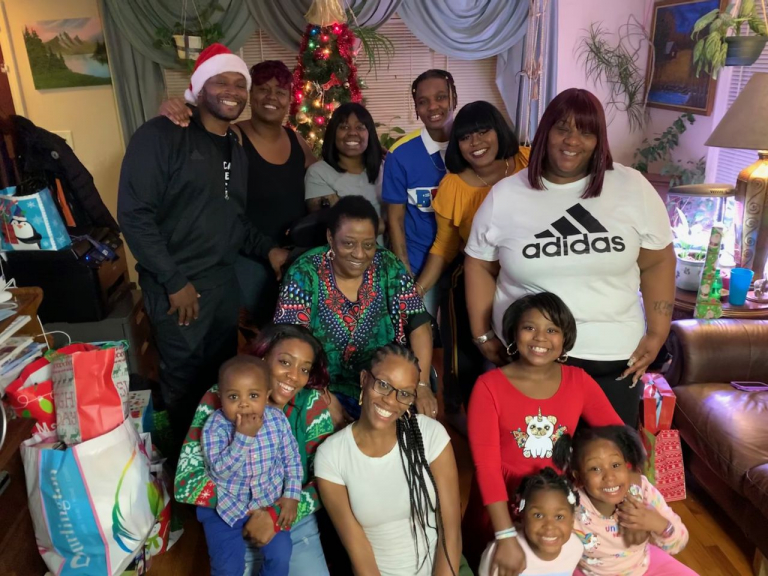Photo at Right Features: Ananda Packer (center with braids and a white T-shirt) and her family in Syracuse. Packer is set to graduate from SUNY Buffalo, but her walk across the stage is likely not going to happen.
Syracuse, N.Y. — Ananda Packer has been dreaming the moment in her head over and over.
She walks across the stage in her cap and gown. Her family is all watching. She accepts her diploma. Then she and all the others toss their black caps into the air.
Packer, 21, is a senior at SUNY Buffalo. She will be the first in her family to graduate from college. And that finish line — the walk across the stage — is something her family has been counting down to.
It seems likely now that Packer’s walk will not happen. She’s among thousands of college students across the state whose schools abruptly switched to distance learning, in some cases indefinitely, in order to slow the spread of the coronavirus pandemic.
But for Packer and nearly 3,000 students who are part of On Point for College, a hard-fought struggle is being upended. On Point is a program in Syracuse and Utica that helps low-income and first-generation college students get into college and stay in.
Often the staff fills in where family cannot. They are the first or second call when there’s trouble. So earlier this week, when colleges began to close, staff cell phones were lighting up.
Each kid’s situation is different, said Chrissie Rizzo, On Point’s grants officer. Are they living on-campus or off? Do they have an off-campus job that they can still go to, and need to go to? If they leave campus, do they have a home to go to? Do they have a laptop and internet access if they go home? Will they have enough to eat if they leave campus?
“These are big decisions young people are being asked to make,” Rizzo said. She, like everyone else at On Point, deals directly with the kids.
Rizzo said if students are at school that is allowing them to stay on campus and doesn’t have current coronavirus cases, the advice right now is to stay put.
“You’ll have food. The labs are open. You sit six feet away from someone,” she said she’s telling students right now. But that message could change.
Rizzo and her colleagues are also trying to make sure the students who come home have everything they need.
She and the others have been talking to community centers, libraries and businesses to see if there are computers or wifi students can use, possibly in off-hours. That’s so they’re able to continue to follow the social distancing guidelines that slow the spread of the coronavirus. And they are seeking out community tutors who are not in the at-risk age group; many of the current volunteers are.
Sam Rowser, the program’s executive director, had a weekend of trips in his van planned. Friday, it was three students in Buffalo. Saturday was a trip to Brockport. Then a trip to Siena. And that will probably change several times.
“Right now students are confused,” Rowser said. “Students aren’t sure what they’re supposed to do.”
The trick is to balance keeping the students safe while making sure they don’t lose valuable academic ground they can’t get back.
Deja McDonald is worried about that. She’s a sophomore at Le Moyne. She’s always lived off-campus, with her family. But the help she got on campus was a big part of how she keeps her grades up in challenging classes like chemistry and biology.
It’s not clear how she’ll stay after for extra help with a professor. It’s also not clear how she’ll be able to do her science labs.
“There’s YouTube, but there’s nothing like having a professor or a tutor who knows it,” McDonald said. McDonald is planning to go to graduate school after this to become a physician assistant.
Rizzo said they understand why the shutdowns are necessary. But the ripple extends past the kids who are in college now. “Nobody is canceling college for next year,” she said.
Starting in February, On Point takes van loads of kids to tour different colleges several times a week. For now, those are shut down.
The pandemic has made change and uncertainty a constant for now. Packer, who plans to open her own nonprofit to help kids like herself, said she’s brainstorming a way to get that walk across the stage for herself and students like her who are losing a hard-fought celebration.
“I only wanted to walk the stage for my family. They’ve always been there for me,” she said. “We gotta find me a stage.”


 RETURN TO NEWS
RETURN TO NEWS